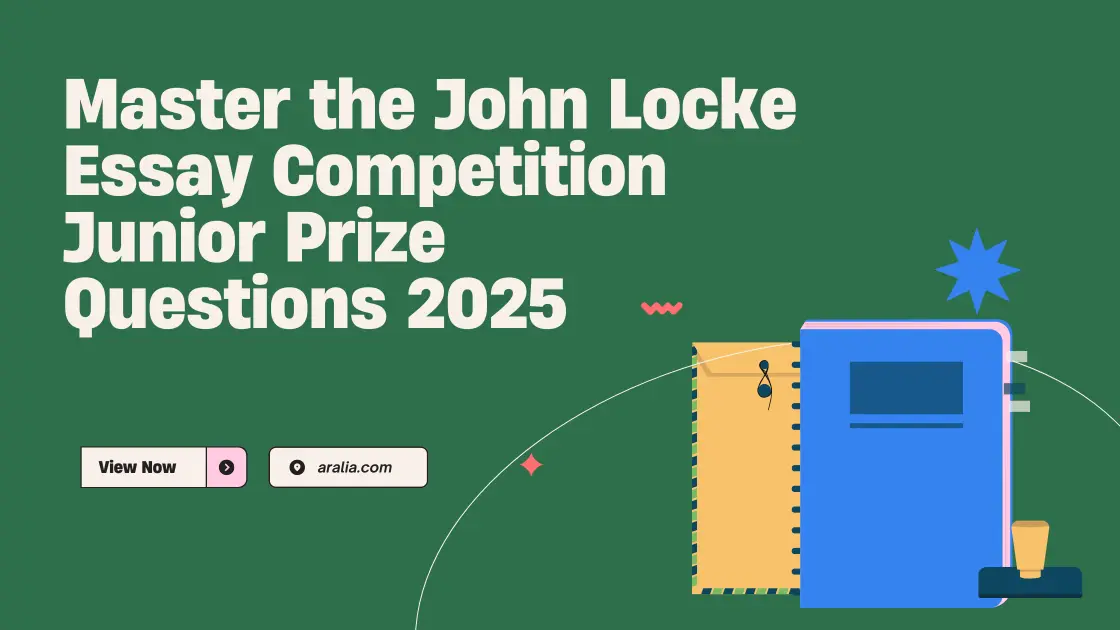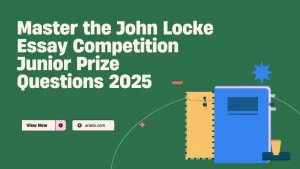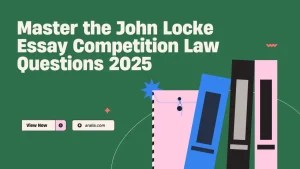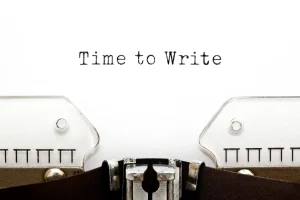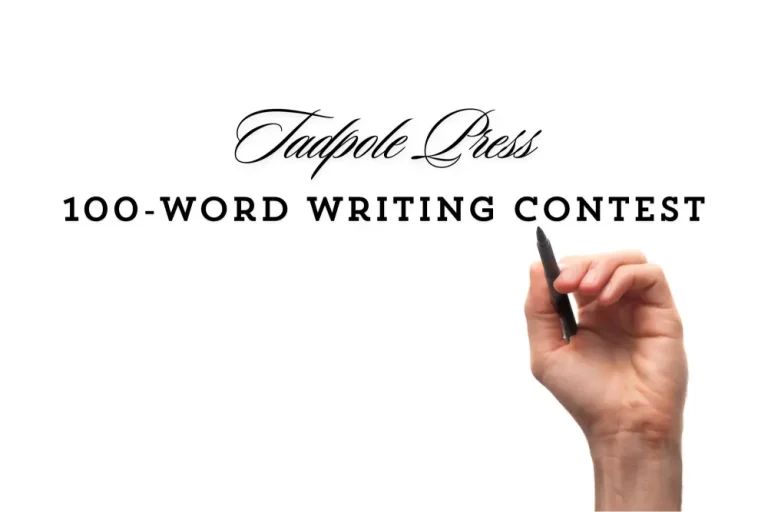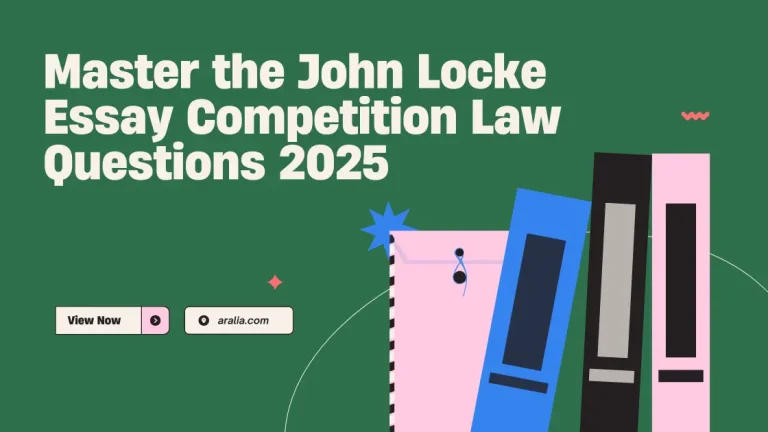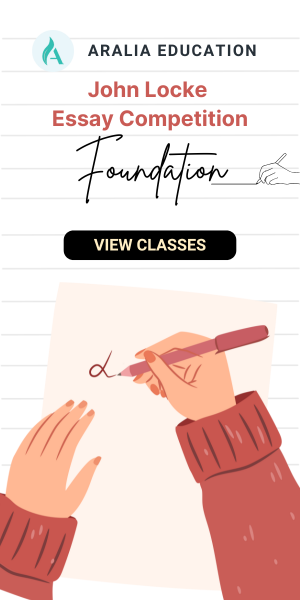New Topics, Extended Deadlines, and Key Changes from 2024
1. John Locke Essay Competition Junior Prize Questions 2025
The John Locke Essay Competition is an international academic contest that invites students worldwide to submit essays responding to thought-provoking prompts set by the John Locke Institute each year. The Junior category is open to students who are fourteen years old or younger before the submission deadline of June 30, 2025. This competition offers participants the chance to showcase their analytical abilities, gain recognition, and challenge themselves in a globally respected academic forum.
Junior Prize 2025 questions
This year, the competition features seven intriguing questions:
- Q1: Your citizenship at birth was chosen for you. Which citizenship would you have chosen?
- Q2: Do you benefit more from your own freedom of speech or from other people’s?
- Q3: Who is more powerful – Donald Trump or Elon Musk?
- Q4: Since 1920, twenty-one presidents and prime ministers from nine countries have been graduates of Philosophy, Politics & Economics (PPE) at Oxford. Would it have been better if they had studied history?
- Q5: What is your fair share of what someone else has earned?
- Q6: Why do you continue to use your smartphone more than is good for you?
- Q7: Why do people become more boring as they grow up and grow older?
Changes in 2025
Compared to previous years, there are some new changes in the John Locke Competition 2025, especially in the Junior category:
- Questions are more contemporary: For the first time, the John Locke Institute has included real-world figures in its essay prompts. This shift makes the competition more relevant to current global discussions, offering students a chance to engage with real-life issues.
- More questions for Junior categories: With seven prompts available—more than in previous years—students have a greater variety of topics to choose from, ranging from political power to personal psychology. Some questions even have a humorous twist, making the competition both challenging and fun.
More changes in the John Locke Essay Competition 2025 can be viewed on this page.
2. Step-by-Step Guidance to Develop a Good Essay for John Locke 2025
A compelling essay for the John Locke Competition requires more than just a strong idea or persuasive argument. Before you begin researching and writing, it’s essential to understand the key evaluation criteria:
- Knowledge and Understanding: Your essay should demonstrate a deep understanding of your chosen topic by engaging with relevant theories, historical contexts, and contemporary discussions. Judges look for well-informed perspectives that show thorough research and critical thinking.
- Competent Use of Evidence: Strong arguments are built on high-quality research and reliable evidence. Use well-sourced data and journal research references to support your claims and make your argument more convincing.
- Quality of Argumentation: A well-structured essay guides readers through your reasoning. Beyond using strong evidence, ensure that your arguments flow logically, with clear subtopics and supporting points that reinforce your main idea.
- Engagement with Counterarguments: Addressing opposing viewpoints adds depth to your analysis. The best essays not only present strong arguments but also anticipate counterarguments, address them fairly, and provide well-reasoned rebuttals.
- Originality, Structure, Writing Style, and Persuasive Force: AI-generated content is strictly prohibited in this year’s competition. Your essay should showcase original thought, a clear structure, a compelling writing style, and persuasive techniques that engage the reader.
- Clarity and conciseness: The strongest essays focus on the prompt, ensuring that every word contributes to the argument. Be sure to follow the 2000-word count limit.
Now that you understand how your essay will be judged, follow these expert-recommended steps to craft a strong and competitive entry:
Read past prize-winning essays: The best way to improve your writing is to learn from successful examples. Reading past winning essays will expose you to effective argumentative techniques, strong evidence use, and compelling writing styles. As you read, highlight phrases and arguments that stand out. Pay close attention to how writers structure their essays, engage with counterarguments, and incorporate external sources. Below is the link to a past winning essay to help guide your approach:
Analyze all prompts before making decisions: Think about ways to challenge or narrow the scope of the question to develop an original and compelling stance. Discussing your ideas with family members, teachers, or friends can sharpen your argument—if your idea sparks debate or disagreement, it’s likely a strong foundation for an essay.
Research your chosen prompt thoroughly: Once you’ve selected a prompt, dive deep into research. Familiarize yourself with the historiography of the topic—understand key debates, influential scholars, and significant books or articles. Ensure that you address major perspectives on the subject. Strong research will add depth and credibility to your essay.
Organize your research before you begin to write: Before you start writing, organize your ideas and research to build a clear structure. Outline your thesis statement and break your argument into subtopics. Under each subtopic, list relevant data, compelling quotes, and key arguments to ensure a logical flow. This step will help you connect your research to your main ideas effectively.
Start writing even if it’s not perfect: Most of us do not know exactly what we want to say until we begin to write. Don’t aim for perfection in your first draft—just get your ideas on paper. Writing will help you identify weak evidence, gaps in logic, or unnecessary points. A rough draft is just the beginning, so don’t hesitate to revise as you go.
Ensure evidence is in every paragraph: A strong essay is built on solid evidence. Every paragraph should contain specific examples, data, or scholarly references to support your claims. More importantly, don’t just state evidence—analyze it. Explain how each piece of evidence strengthens your argument and ties back to your thesis.
Edit, edit, and edit: Editing is the most crucial part of crafting a high-quality essay. No one writes a perfect essay on the first attempt. Revise your draft multiple times to improve clarity, strengthen arguments, and refine your writing style. Seeking feedback from a teacher, mentor, or peer can also provide fresh insights and help you identify areas for improvement.
3. How to Approach 2025 John Locke Essay Competition Junior Prize Questions
To help students approach their essays, we asked our instructor to analyze two of the seven Junior category prompts from this year’s John Locke Essay Competition. This expert breakdown can serve as an example to further evaluate other questions.
The first question that our instructor picked is: Why do people become more boring as they grow up and grow older?
This question challenges young people to explore the idea that adults may become less adventurous or imaginative as they age. One interpretation of this question can be how younger people perceive what is and isn’t interesting rather than the uninteresting perspective of older people. Is it that people actually become more boring as they age, or do younger generations simply have a different perspective on what’s interesting?
This may also be a good essay to analyze through the lens of psychology. You can explore the psychology of aging, the changes in personality traits over time, and how introversion often increases with age. Cultural perspectives also play a role—different societies view childhood, adolescence, and adulthood in unique ways, which may influence perceptions of excitement and dullness. How do people in different age groups and different cultures think about children, teens, young adults, middle-aged, and elderly adults in terms of being boring? You may find thought-provoking insights or opposite viewpoints from your research that spark an idea for the main discussion throughout your essay.
The second question that our instructors provide guidance about is: Who is more powerful – Donald Trump or Elon Musk?
This question asks students to think about power and how it works in today’s world. To answer this, students first need to define power. Is power about politics (making laws and leading a country), economics (owning businesses and controlling industries), or social/cultural (shaping public opinion and spreading ideas)?
Next, students should look at how Trump and Musk use their power. What type of power do they have, political, economic, or social? Do they have more than one type of power? You can also explore different ideas about power, like Karl Marx’s theory of false consciousness, which suggests that those in control shape how people think. This can help you further explore the question and form an argument for your essay.
While this analysis provides one way to interpret the question, remember that John Locke’s prompts are broad and open-ended for a reason. There is no single correct answer, so don’t disregard any idea before fully exploring it. Even a thought that seems trivial at first might lead to a compelling and original argument. Keep questioning, researching, and refining your perspective—you might be surprised where your thinking takes you!

4. Things to Keep in Mind
Make your claim within the first two paragraphs: With a 2,000-word limit, it’s crucial to present your main argument early. Avoid lengthy introductions—clarity and precision will strengthen your essay.
Learn to incorporate quotes within your analysis: Judges expect you to incorporate both primary and secondary sources to support your argument. Choose quotes that reinforce your claim and integrate them smoothly into your writing. Always follow a quote with an analysis—explain its significance and how it strengthens your argument.
Edit unnecessary phrases, sentences, and ideas out of your essay: Every sentence in your essay should serve a purpose. If an idea, phrase, or sentence does not directly contribute to your argument, remove it. Looking at past winning essays, you’ll notice that they are concise, with no unnecessary content.
Acknowledge counterarguments confidently: A strong essay doesn’t just present one side—it anticipates opposing viewpoints and refutes them with well-reasoned analysis. Judges want to see that you can engage with competing perspectives while maintaining a clear, evidence-based argument for your claim.
5. John Locke Essay Competition Timeline
March and April
- Before registration opens: Begin exploring the essay questions and conducting preliminary research. Look at newspapers, books, and other resources on the topic of interest. This will help you identify which question to select.
- After registration opens: Ensure you’ve chosen your question and are ready to register.
April and May
- Early April: Finalize your question selection.
- April to May: Focus on targeted research. Start building your research log and expanding your knowledge of the topic. Look at legal journal articles to go beyond basic facts and understand how other writers approach similar issues.
- By early May: Begin drafting the essay. The month of May should be dedicated to writing the essay after you create a detailed outline to keep your argument structured.
June
- June: Focus on revisions, cleaning up citations, and adding any necessary final research. This is also the time to address feedback and strengthen any weak arguments.
- Act as if the deadline is June 25 or 26: Submit a few days in advance to avoid last-minute technical issues with your computer or file. Don’t wait until June 30!
Further Reading:
6. Aralia’s John Locke Competition Prep
In this John Locke Essay Competition Prep course, students will learn the ins and outs of essay writing in preparation for entering the competition. We offer prep classes in all categories: philosophy, politics, economics, history, psychology, theology, and law. Students will choose one topic, compose an original thesis and argument, and write an essay for submission. They will engage in a guided analysis of primary and secondary sources, develop critical thinking skills, and discover novel insights. In addition to the group lecture classes, students will receive guidance on their individual projects from the instructor in one-on-one sessions.

John Locke Essay Competition Prep
In this John Locke Essay Competition Prep course, students will learn the ins and outs of essay writing, in preparation for entering the competition. We offer prep classes in all categories: philosophy, politics, economics, history, psychology, theology, and law. Students will choose one topic, compose an original thesis and argument, and write an essay for submission. Students will engage in a guided analysis of primary and secondary sources, develop critical thinking skills, and discover interesting insights. In addition to the group lecture classes, students will receive guidance on their individual projects from the instructor, in one-on-one sessions.

